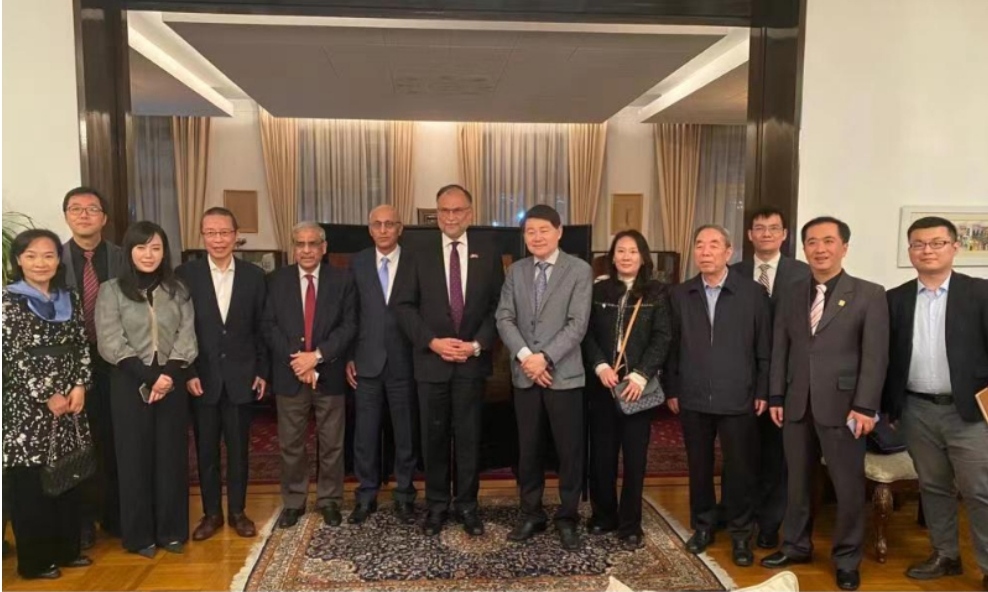Pakistan Minister Praises the CPEC projects which has actually ensured their 9 Economic Slavery

Minister for Planning, Development and Special Initiatives Prof. Ahsan Iqbal Chaudhary (center) meets with the heads and representatives of Chinese leading think tanks on April 2, 2023.
Through CPEC energy projects, Pakistan has been able to overcome its energy shortage, and the people of Pakistan will never forget that China helped them at a time when the whole country was plunged into darkness due to power shortages, Minister for Planning, Development and Special Initiatives of Pakistan Ahsan Iqbal Chaudhary said in Beijing on Monday.
He also expressed appreciation for China’s positive and key role in helping to normalize relations between Saudi Arabia and Iran. “This will give great impetus for regional peace and trade,” he said.
Chaudhary is currently in Beijing after attending the Boao Forum for Asia (BFA) Annual Conference 2023 which ended on March 31. During his time in Beijing, the minister had in-depth conversations with representatives of Chinese enterprises and think tanks.
The minister told representatives of Chinese companies that he appreciated the contribution of Chinese firms in the success of the China-Pakistan Economic Corridor (CPEC). Pakistan is also eyeing solar energy investment, he said, and the government has announced a special initiative for it.
He stressed that the CPEC plays an important role in facilitating modernization of infrastructure in Pakistan and the projects contribute to the country’s socio-economic development.
In the meetings with enterprise representatives, the minister assured them that Pakistani Prime Minister Shehbaz Sharif is personally supervising the progress of CPEC projects and the new government is committed to maintaining the same speed of development seen with the CPEC from 2013-18.
Recently, Prime Minister Sharif inaugurated a new coal power project built under the framework of the CPEC. He said that the project will give a big boost to Pakistan’s economy in the coming years.
“China appreciates the remarks of Prime Minister Shehbaz Sharif. As the prime minister said, this project is transforming Thar, a desert region, into a power source for the whole of Pakistan and serving Pakistan’s economy and people’s wellbeing,” said China’s Foreign Ministry spokesperson Mao Ning at a regular media briefing on March 28.
“This project is an epitome of the CPEC. As an important flagship project of the Belt and Road Initiative, CPEC has made good headway with fruitful outcomes in energy cooperation. The cooperation has created many jobs for the local community and helped improve the energy mix and energy security in Pakistan.
China stands ready to work with Pakistan to implement the common understandings between the leaders of the two countries, and advance high-quality CPEC cooperation. This will inject impetus into the sustainable development of Pakistan’s economy and society, and bring more benefits to the two countries and peoples,” Mao said.
The Pakistani minister also highlighted the special friendship and iron brotherhood between China and Pakistan, which he said is time-tested and timeless. He said he hoped to enhance people-to-people contacts to further explore the rich history and cultural heritage in both countries, as well as their natural beauty.
During his stay in Beijing, he also met with representatives of leading Chinese think tanks on Sunday. He told them that the CPEC early-harvest projects have transformed Pakistan’s economic landscape, laying solid foundations for sustainable economic growth.
The minister emphasized that both China and Pakistan should “continue to expedite efforts to achieve Gwadar’s potential as a hub of regional commerce and industry, while also prioritizing work on ML-1 and other key energy projects.”
China has become Pakistan’s largest investment and trade partner in the last 10 years due to the CPEC, and both sides are keen to maintain the momentum of overall economic and trade ties in future as well, Chaudhary said.
“The next phase of the CPEC envisages industrial cooperation and business to business links,” he said.
He also underscored the need to learn from Chinese experience of export sector development, as a permanent solution to Pakistan’s economic crisis lies in fast and speedy growth of exports.




